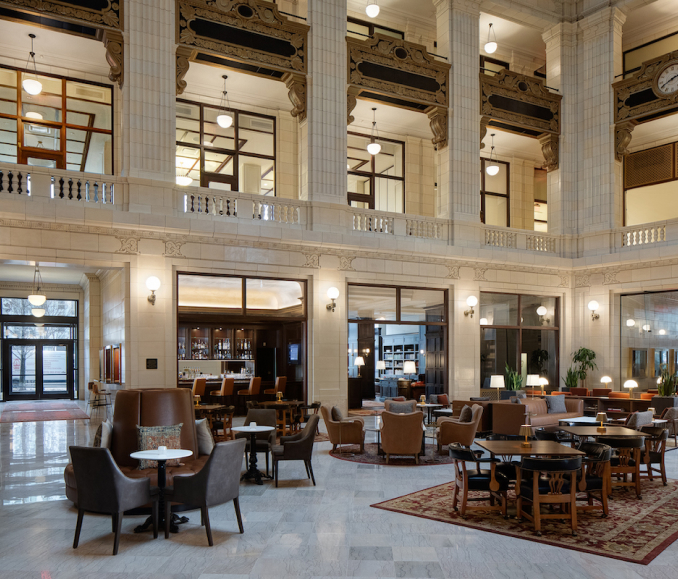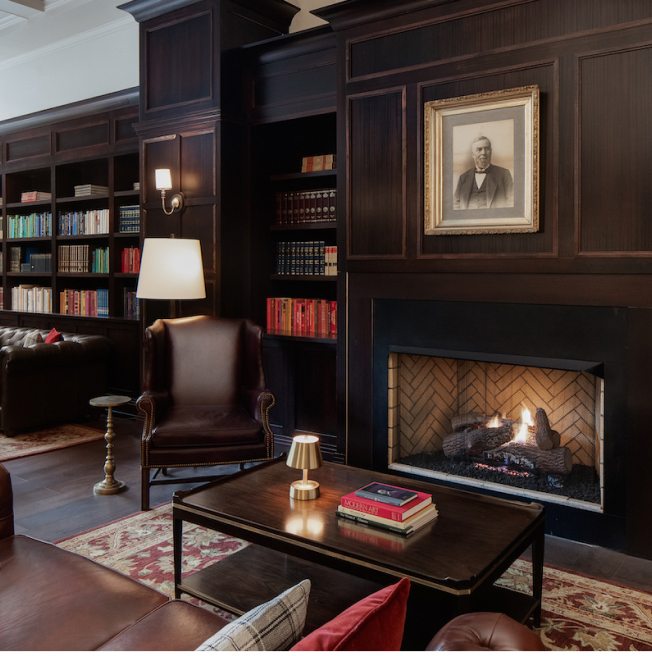


The Hotel David Whitney is one of the most significant buildings in Detroit’s northern skyline. Named after lumber baron David Whitney Jr. the building is an architectural gem designed by the renowned firm of Daniel H. Burnham & Co. – one of only three existing buildings designed by Burnham left in Detroit. David Whitney Jr. amassed his wealth through the lumber industry and real estate, making him one of Detroit’s most influential men by the late 19th century.
In the early 20th century, his son, David Charles Whitney, dreamed of creating a space where all of Detroit’sbest doctors could practice. In 1915 his dream became reality as he opened the 18-story David Whitney Building, facing Grand Circus Park and flanking Woodward Avenue and Washington Blvd, two of downtown’s most prominent thoroughfares and. The David Whitney joined an already bustling shopping and entertainment district around the Park that included such storied hotels as the Statler and Tuller, and would within a decade become the home to the largest collection of theatres in the United States outside of Manhattan.
The building’s most striking feature is its grand atrium, which rises four-stories to a massive skylight and is lined with decorative terra cotta. The Atrium housed a variety of high-end shops and services, making it Detroit’s first fully-enclosed shopping center as well as first medical office building. This combination of offerings made the David Whitney one of the City’s most visited buildings by Detroiters of all walks by the middle of the of the 20th century.
Like many of Detroit great buildings, the David Whitney suffered from the mid-20th-century exodus to the suburbs. The decline began in the 1950s as residents started to move out from the City center and their doctors and dentists followed suit. In 1959, in an attempt to compete with newer properties, the Whitney family undertook an ambitious modernization of the building, stripping away its classical exterior details in favor of a more mid-century modern look. Fortunately, the interior was spared and the ornate Atrium and marble and mahogany-lined corridors remained intact.
The Whitney family sold the property in 1965 and a succession of owners could not stem the decline that would eventually impact all of Grand Circus Park and the wider Theatre District. The David Whitney Building finally closed its doors in 2000. In spite of numerous plans for its redevelopment during the ensuing decade, the property remained empty and boarded until the Roxbury Group acquired it in 2011. Their $92 million renovation restored the building’s historic exterior features and fully renovated the former office and retail space to adapt it to modern residential and hospitality uses.
In December of 2014 Detroiters gathered for a symbolic “flipping of the switch” to light The David Whitney Building’s facade for the first time in the 21 st Century. Some descendants of David Whitney were in attendance as the building re-opened to include an Aloft Hotel featuring 136 rooms and 105 residential apartments. The project was an immediate success, setting into motion a rebirth of hospitality in Detroit’s Theatre District, which would later include the Siren, Shinola and Roxbury’s own Element Detroit at the Metropolitan Building.
In 2020 a worldwide pandemic emptied America’s cities and threatened to derail downtown Detroit’s remarkable renewal. Instead of retrenching, the Roxbury Group took the opportunity to collaborate with Marriott on a bold reimagining of the David Whitney. In the three years that followed they invested in an entire renovation of the property to the Hotel David Whitney – an Autograph Collection Hotel. In doing this, their inspiration was not the building’s original history as much as it was the era it represents.
This reimagining has brought the 110-year story of the David Whitney full-circle by reaching into Detroit’s golden age of hospitality in order to bring back something from that time and place that our city had lost –namely its Grand Hotel. For more on the history of the David Whitney visit HistoricDetroit.org.